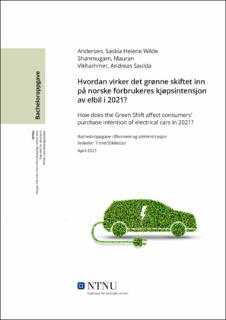| dc.contributor.advisor | Stiklestad, Trond | |
| dc.contributor.author | Andersen, Saskia Helene Wilde | |
| dc.contributor.author | Shanmugam, Mauran | |
| dc.contributor.author | Vikhammer, Andreas Saulda | |
| dc.date.accessioned | 2021-09-14T17:19:09Z | |
| dc.date.available | 2021-09-14T17:19:09Z | |
| dc.date.issued | 2021 | |
| dc.identifier | no.ntnu:inspera:80204379:80898396 | |
| dc.identifier.uri | https://hdl.handle.net/11250/2777269 | |
| dc.description.abstract | De aller fleste er enige om at klimaendringene er en av de største utfordringene verden står opp mot i dag. For å stanse disse endringene må vi redusere utslippet av klimafiendtlige gasser. Biler med forbrenningsmotor er som kjent en viktig kilde til forurensing. Samtidig har det norske elbilmarkedet vokst enormt de siste årene. I 2020 ble Norge det første landet i verden med over 50 prosent nyregistrerte elbiler i nybilmarkedet. Det finnes flere årsaksforklaringer for den enorme veksten i elbilmarkedet. Denne oppgaven har til hensikt å undersøke det grønne skiftets rolle som forklaringsvariabel til kjøp av elbil. Staten er en sentral pådriver for et fremtidig lavutslippssamfunn. Norge har opparbeidet seg en sofistikert elbilpolitikk, der fordeler knyttet til kjøp og bruk av elbiler er sentrale virkemidler. Oppgaven konsentrer seg om forbrukerens miljøbevissthet og andre dimensjoners innvirkning på kjøpsintensjon av elbil. Med bakgrunn i dette har vi utviklet problemstillingen: «Hvordan virker det grønne skiftet inn på norske forbrukeres kjøpsintensjon av elbil i 2021?»
Problemstillingen drøftes i lys av relevant teori, både fra et makro- og mikroperspektiv. Det teoretiske fundamentet bygger på teorien om planlagt atferd, PESTEL-modellen, og adopsjons- og diffusjonsprosessen. For å analysere og belyse dette ble det brukt kvantitativ tilnærming, en forskningsmetode som er hensiktsmessig da vi ønsker å se på et større utvalg av enheter. Videre har vi konstruert en web-basert spørreundersøkelse.. Besvarelsen tar utgangspunkt i en populasjon som baserer seg på forbrukere som enten har kjøpt, eller vurderer å kjøpe elbil i 2021. Utvalget er selvutvalgt, og det totale antallet respondenter endte på 363. Videre er det utviklet fire hypoteser. To av dem fokuserer på fjerning av insentiver som vi antar har stor innvirkning på forbrukers kjøpsintensjon, og om fjerning av disse faktisk påvirker kjøpsintensjonen i betydelig grad. De resterende to hypotesene fokuserer på normer og forbrukers omgangskrets, samt miljøvariablene nullutslipp og samfunnsansvar.
Resultatene fra undersøkelsen viser at forbrukerne fortsatt anser økonomiinsentivene som de mest sentrale variablene ved kjøp av elbil. Dette er ikke overraskende, da bil sannsynligvis er noe av det dyreste respondenten eier. Undersøkelsen viser likevel at miljøfaktorene nullutslipp og samfunnsansvar har større innvirkning på kjøpsintensjon av elbil i 2021 enn tidligere. Det kan tyde på at det grønne skiftets innvirkning på forbrukernes kjøpsintensjon stadig utvikles, noe som gagner en bærekraftig utvikling, både i bilindustrien og i forbrukersamfunnet. | |
| dc.description.abstract | The vast majority agree that climate change is one of the biggest challenges facing the world today. To stop these changes, we must reduce the emissions of greenhouse gases. Vehicles with internal combustion engines are known to be an important source of pollution. However, in 2020, Norway became the first country globally with over 50 percent newly registered EVs in the new car market. There are several explanations for the enormous growth in the EV market. This thesis investigates the role of the green shift as an explanatory variable for the purchase of an electrical car. Norway has built up an advanced EV policy, where benefits related to purchasing and using EVs are key instruments. The thesis focuses on the consumer's environmental awareness and other dimensions' impact on the purchase intention of an electric car. Hence the chosen background and theory, we have developed this problem statement: “How does the Green Shift affect consumers’ purchase intention of electrical cars in 2021?”
The problem statement will be discussed with relevant theory, both from a macro and a micro perspective. Relevant theory involves Theory of Planned Behavior, the PESTEL model, and The Adoption and Diffusion process. Being able to analyze and illuminate the chosen statement, we used the quantitative research method. A method which suits well, since we are looking for a greater number of units. We have also constructed a web-based survey. The results are based on a population that focuses on consumers who have already purchased an electrical car or considers buying one in 2021. Our selection is self-selected, and the total amount of units ended up being 363. Furthermore, we have developed four different hypotheses. Two of them are concentrating on the removal of incentives which we assume has a great impact on the purchase intention, and if removal of these incentives actually affects the intent. Additionally, the two remaining hypothesis focuses on norms and consumers reference groups, as well as two climate variables: zero emissions and social responsibility.
Results from the survey display that the consumers still consider the economic incentives as the most significant variables. This is no surprise as cars are expensive, and it is probably one of the more costly items the respondent owns. Still, our survey shows that the included climate variables have a greater impact on the purchase intention of electrical cars in 2021 than in previous years. It may indicate that the Green Shift’s impact on consumers' purchase intention is constantly evolving, which benefits sustainable progressing, both in the car industry and in the consumer society. | |
| dc.language | nob | |
| dc.publisher | NTNU | |
| dc.title | Hvordan virker det grønne skiftet inn på norske forbrukeres kjøpsintensjon av elbil i 2021? | |
| dc.type | Bachelor thesis | |
